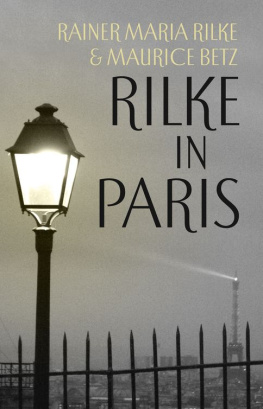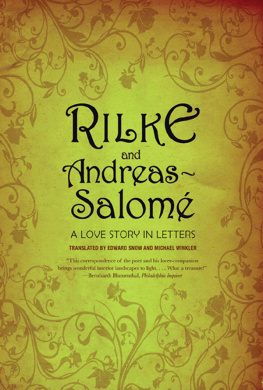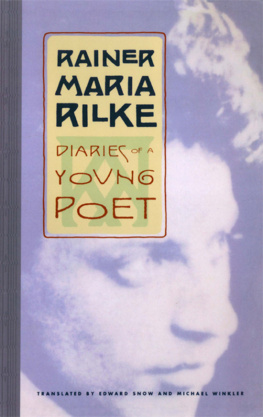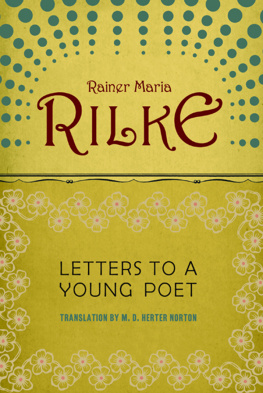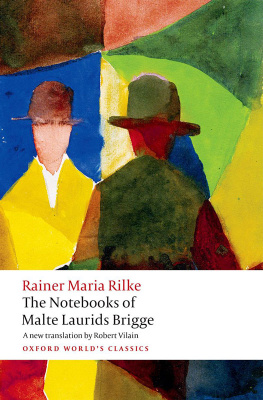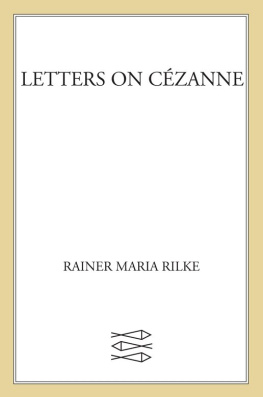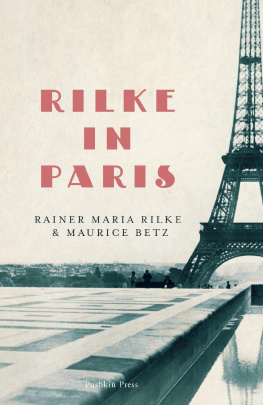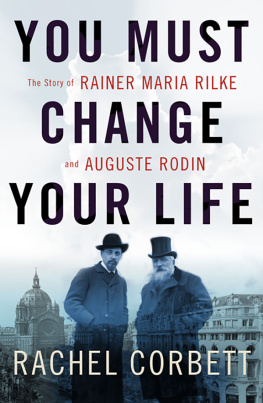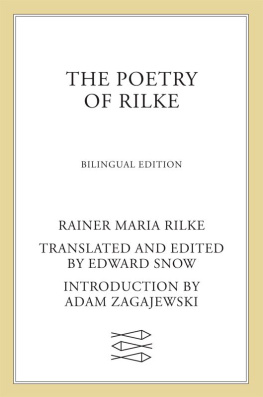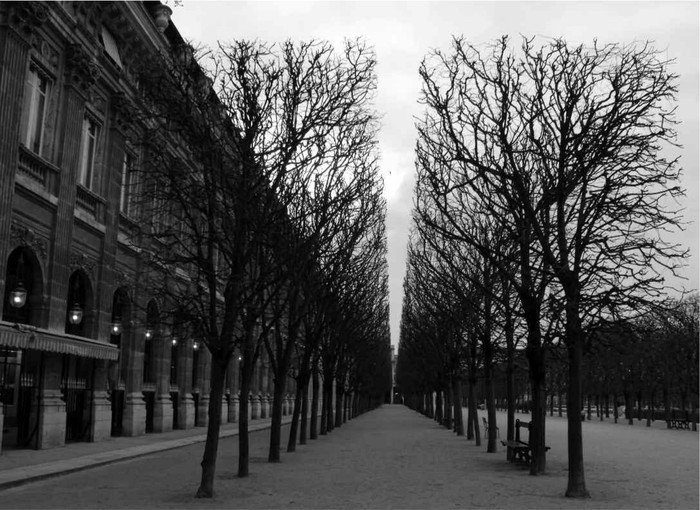
1. The gardens of the Palais Royal
Rainer Maria Rilke arrived in Paris for the first time on 28 August, 1902, as a still youthful poet seeking the best experiences and location from which to access his inwardness, a poet whose body of work, though already receiving recognition, had not yet earned its distinction of genius. He left it for the last time in the same month twenty-three years later, a celebrated poetic figure in poor health, whose legacy was now confirmed. The following year, in 1926, he died at his home, at the chateau of Muzot in the Valais, a French-speaking canton of Switzerland. During those twenty-four intervening years the French capital would become for Rilke, a poet who, more than any other, oiled his precarious existence with almost continual European peregrination and a heavy dose of patronage, the place he might call home. However, in the midst of these two decades of ever-penurious creative germination, sprouting, blossoming and harvest, crouched the black dog of the First World War. Despite his relatively benign experience of war (three months of military service in Vienna), the 191418 conflict constituted an external trauma that threatened to usurp Rilkes mental cartography , leaving him drained and disorientated in terms of his ability to continue his literary work. He was forced back to Germany for the duration of the conflict and the severing from his previous life of European displacement, together with a sense of horror at the wars catastrophic annihilating power, the ruthless removal of both individual personalities and the creatively rich era that produced them, ushered in a period of sterility, which was only resolved long after the wars end.
Having dispensed with overbearing family ties and fled the perceived provincialism of Prague, Rilke was a hypersensitive dreamer adrift, nurturing a growing pregnancy of the senses. But to deliver the birth and be relieved of this weight, to coax his latent talent to manifest itself properly, he needed an atmosphere that was sympathetic to his complex and not yet fully marshalled inner self; a precise location equipped to sustain such an undertaking. He was also looking for a personal master, a senior example from whom he could take counsel, whose behavior he might replicate to bring on those inner shoots he increasingly realized must not bloom prematurely, if they were to achieve anything of lasting greatness. From those first feelers in Paris at the dawn of the century, until final salvation in a veritable storm of creativity, at Muzot in 1922, all Rilkes movements and behaviour, his aspirations and energies , are focused on this sole requirement for inner synthesis. It is this unremitting search with its dead ends and disappointments , its sudden unforeseen deliverances and mysterious gifts, that Betz traverses so poignantly in his essay, quoting liberally from the copious and notably rich letters penned by the poet to his wife and friends and from The Notebooks of Malte Laurids Brigge, the now famous prose work that consummates Rilkes Paris experience.
Touring Russia with Lou Andreas-Salom in 1900, Rilke thought he might find a guiding figure in the great novelist Tolstoy. But to no avail. (See Notes on Places.) Rilke appealed to Tolstoy for counsel:
I still lack the discipline, the being able to work and the being compelled to work, for which I have longed for years. Do I lack the strength? Is my will sick? It is the dream in me that hinders all action? Days go by and sometimes I hear life passing. And still nothing has happened. Still there is nothing real about me.
Tolstoys answer was simply write!, but Rilke, having come such a great distance, was hoping for a few more words of wisdom. He moved on to the artists colony of Worpswede, amid the wind-combed heaths and plains of Northern Germany . Another potential location perhaps, but through those he befriended, and, in the case of the young sculptor Clara Westhoff, married, he only edged closer to the defining figure of Rodin and the unknown quantity of Paris. By the close of summer 1902, he was finally in the capital, meeting the great artist, and here his relationship with France properly begins.
France, traditionally viewed as the natural home of the artist, still professed in Rilkes day at least, to sustain an aristocracy of talent. Here it was thought genius could best flourish, the ideal of beauty, le beau, still endured right down to the common man, and the artist was seen as the necessary foil to the spiritual paralysis of the bourgeois or philistine. And although Austrian writer Rudolf Kassner warned that Rilkes love for France was nothing more than the German love for the foreign, it is obvious that, even in the first flush of his relationship, France offered Rilke the pertinent literary and artistic architecture to coincide with his precociously maturing tastes and appetite for a concentrated cultural education. While based in Paris he made many instructive trips to the provinces. He visited the Roman ruins of Provence, the medieval towns of Burgundy, the cathedrals of Chartres, Bourges, Reims and many other notable locations. France provided the great personal examples of the patient indefatigable worker, from Rodin, who figures so strongly in the early period and in the pages of Rilke in Paris, through to Czanne, interpreted as such through his biography and then in the later period in Paris, the Franco-Belgian poet Emile Verhaeren. Rilke who had roused the ghost of Verhaeren as Mr V in his controversial Workers Letter of 1922, revered the Belgian poet as a visionary master of the here and now. Rilke was rarely without a collection of Verhaeren to hand in this period and constantly expounds on the life-affirming breadth and energy of his poetry, especially that of the posthumously published Les Flammes Hautes of 1917, in letters to friends and patrons.
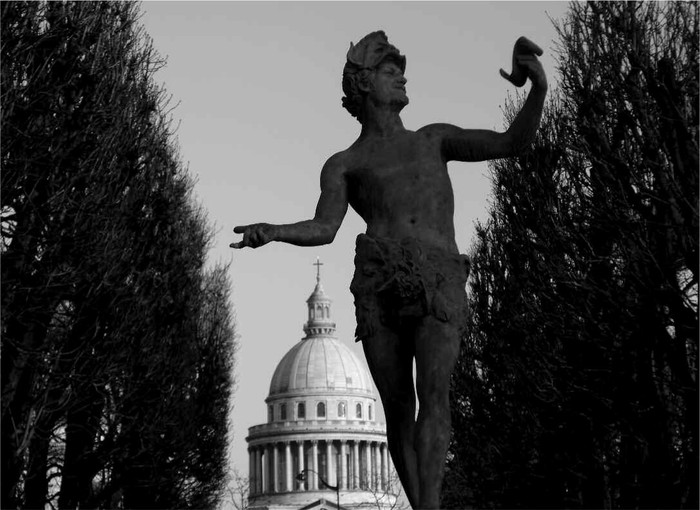
2. The Panthon from the Luxembourg Gardens
In Maurice Betz, France also offered a sympathetic and dedicated translator of Rilkes works, and during that last summer in Paris the two worked closely on the French translation of The Notebooks of Malte Laurids Brigge, the work that forms the backbone of Rilke in Paris. In fact it is evident that, along with Italy in a supporting role, France and French culture are the dominant guiding forces of Rilkes adult life, exemplified perhaps by the fact that he celebrated this relationship by writing some four hundred poems in French, translated a clutch of French poets, chose to settle in a French-speaking region and became, in his later years, more deeply absorbed in the work of the French poet Paul Valry than in that of any other writer. In the Valais Rilke claimed that he had found a combination of landscape and climate more perfect than any other he had encountered during his life. For even then, the search was no less pressing to find the ideal productive climate, the location and atmosphere most conducive to unbroken solitude and steady unhindered work.
However, not all was straightforward or comfortable for Rilke during his final sojourn in Paris, and Betz provides some hints at the close of his essay on the rather ambiguous and not always fulfilling relationships Rilke experienced in his involvement with the Parisian literary scene. Betz also suggests that the sometimes vague and nonchalant Valry did not always give Rilke the level of attention that the latter would have liked. However, the curious bond between these two very different poets was one of respectful mutual awareness of their significance , and a realisation of what each one might gain from the other. But crucially only Rilke had the measure of the others language. Valry struggled to gain a foothold in Rilkes mysterious universe of feelings, while Rilke was intoxicated by the French poets condensed language, his way of getting to the core with the minimum of fuss. Rilke felt he was always on the back foot by being obliged to express himself in German. He saw in Valry a clear path through the thicket to the light-filled glade beyond, and through his free translations of the poetry determined to follow it. But Valry, analytical, methodical, intellectual, was the antipode to Rilkes romantic, subjective poetry of feeling. Rilke excitedly discovered in Valrys French the kind of language vehicle he himself had been trying to design from German for years, and whose blueprint Valry, now emerging suddenly into the light, calmly and confidently laid down like a Royal Flush. Rilke was drawn into a profound seduction, where the seducer was never quite able to reciprocate.

